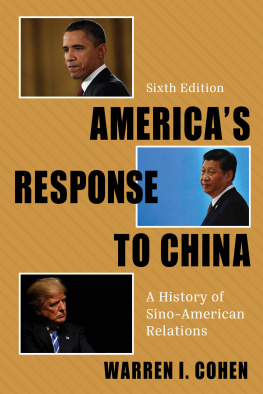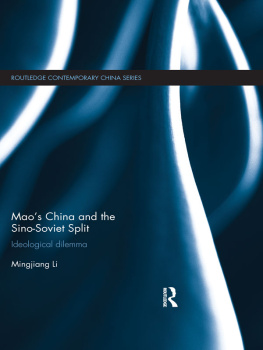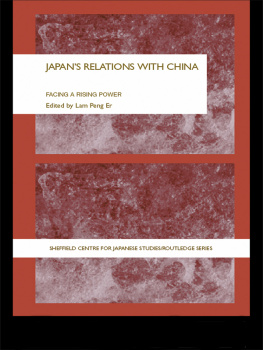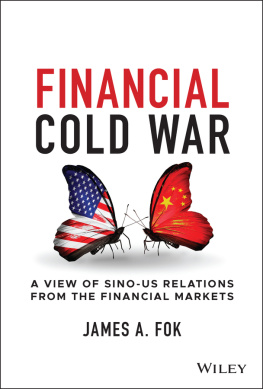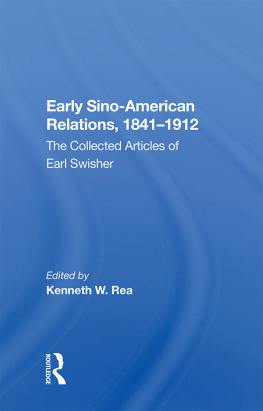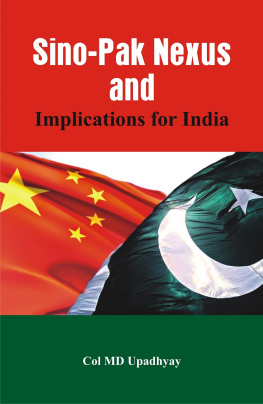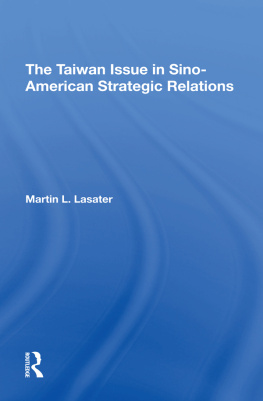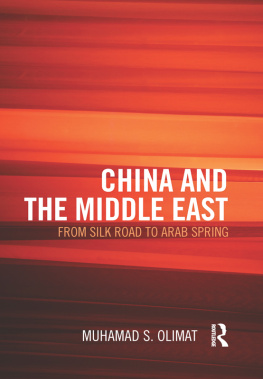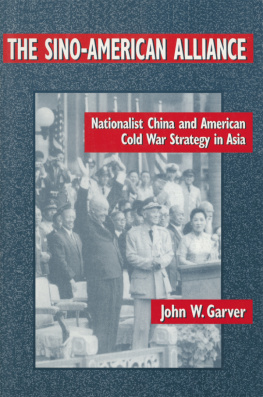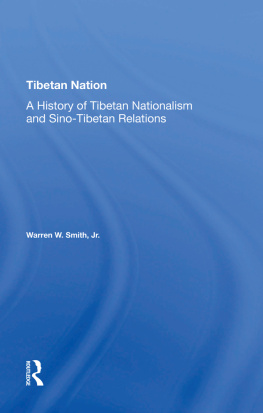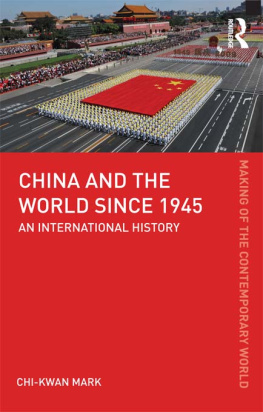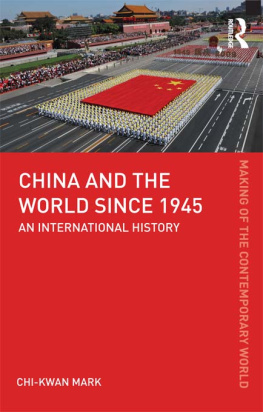AMERICAS RESPONSE TO CHINA
AMERICAS RESPONSE TO CHINA
A History of Sino-American Relations
SIXTH EDITION
Warren I. Cohen
Columbia University PressNew York
Columbia University Press
Publishers Since 1893
New YorkChichester, West Sussex
cup.columbia.edu
Sixth edition 2019 Columbia University Press
Fifth edition 2010 Columbia University Press
Fourth edition 2000 Columbia University Press
Third edition 1990 Columbia University Press
Second edition 1980 John Wiley and Sons Inc.
First edition 1971 John Wiley and Sons Inc.
All rights reserved
E-ISBN 978-0-231-54961-5
Library of Congress Cataloging-in-Publication Data
Names: Cohen, Warren I., author.
Title: Americas response to China : a history of Sino-American relations / Warren I. Cohen.
Description: Sixth edition. | New York : Columbia University Press, 2019. | Includes bibliographical references and index.
Identifiers: LCCN 2019017894 | ISBN 9780231191982 (cloth : alk. paper) | ISBN 9780231191999 (pbk. : alk. paper) | ISBN 9780231549615 (ebook)
Subjects: LCSH: United StatesForeign relationsChina. | ChinaForeign relationsUnited States.
Classification: LCC E183.8.C5 C62 2019 | DDC 327.73051dc23
LC record available at https://lccn.loc.gov/2019017894
A Columbia University Press E-book.
CUP would be pleased to hear about your reading experience with this e-book at
COVER IMAGES:
Barack Obama Kevin Lamarque/Reuters Pictures; Donald Trump and Xi Xinping Jonathan Ernst/Reuters Pictures
In memory of Nancy Bernkopf Tucker
(With whom I had hoped to write this edition)
Contents
I write now, in the fall of 2018, with great concern about the future of Chinese-American relations. As I observe Chinas rise, its assertiveness in the South China Sea, its efforts to challenge American hegemony in the western Pacific, to create structures that would undermine the role of the United States in Asia, Xi Jinpings willingness to take risks unimaginable to his predecessors and the incompetence of the Trump administrationI must fear that we will stumble into armed conflict before I get to the seventh edition.
It is far too early to attempt a history of the Trump administrations policy toward China. What you see today may be gone tomorrow. What I dare write today might prove absurd to a reader five years from nowor even next week. Instead, the major revision in this edition is a discussion of the years 2009 to 2016 when Barack Obama and his aides tried to cope with Chinas rise. Several participants have written books and essays. They and othersincluding Obamahave spoken openly when interviewed by journalists. There is no shortage of critics, especially those who served in the administration of George W. Bush, eager to remind us how much better they did things. I am privileged to be acquainted with many of the Obama aides and many of the critics and have heard them and others speak often at the Council on Foreign Relations (not-for-attribution), the Brookings Institution, the Center for Strategic and International Relations (CSIS), the Carnegie Endowment for World Peace, and the Woodrow Wilson Center (at which I am a nonresident senior scholar). There can be no better place than Washington for studying Americas role in the world.
I have also revised some of my concluding thoughts in the closing pages, reflecting my mounting pessimism.
Finally, I have never felt the loss of Nancy Bernkopf Tucker more than when writing this. She was my most knowledgeable and merciless critic.
Before the first edition of this book was published, I imposed on several friendsall since deceasedand asked them to read it. Tadashi Aruga, Dorothy Borg, Michael Gasster, Stull Holt, and James C. Thomson Jr. responded with countless suggestionswhich I valued even when I did not follow them. Robert A. Divine read it in his capacity as editor in the series in which it appeared, and Janice Prichard Cohen read it in an earlier incarnation as my wife. My readers saved me from considerable embarrassment and, if I were not so vain about my writing, they might have been able to help more.
Like every historian working in the field of AmericanEast Asian relations, I was indebted to Dorothy Borg and John Fairbank for many of my ideas. In the years that followed, countless friends contributed further to my education and to the revisions and additions that appeared in subsequent editions. I am especially grateful to A. Doak Barnett, Richard Bush, Paul A. Cohen (who pretends to be my elder and wiser brother), Rosemary Foot, Harry Harding, Waldo Heinrichs, Michael H. Hunt, Akira Iriye, Walter LaFeber, James Mann, Ernest R. May, Michel Oksenberg, Nancy Bernkopf Tucker (long before she was foolish enough to marry me), and Allen S. Whiting for the many insights they provided through their work and the stimulating conferences and informal discussions in which we have participated over the years.
I asked three friendsTom Christensen, Bonnie Glaser, and Jim Mannto read the section on Barack Obama. Although they acknowledged they were poor substitutes for Nancy, they were extremely helpful. In addition, Bonnies regular essays on Chinese-American relations (currently three times a year) for Comparative Connections provide the most valuable chronology available.
I have also been fortunate over the years to have had assistance from many Chinese scholarsLi Shenzhi, Luo Rongqu, Wang Xi, and Zi Zhongyunand others whom I dare not put at risk. Similarly, I had valuable conversations with many Chinese officials, of whom I assume Huang Hua and Xue Mouhong are safe from retribution.
Finally, Id like to thank my editors at Columbia University Press for taking on Americas Response to China after the demise of the original series. Kate Wittenberg arranged the transfer, Anne Routon continued her work, and Stephen Wesley has overseen this editionall great people to work with.
The romanization of Chinese characterslong dominated by the Wade-Giles systemused in the first four editions of this book and still used in Taiwan has been displaced largely by pinyin, a system devised in the Peoples Republic of China. To minimize confusion, I provide below a list of names mentioned in order of appearance in the text in both systems. Names followed by an asterisk are neither Wade-Giles nor pinyin but are common usage.
WADE-GILES | PINYIN |
Chi-ying | Qiying |
Ching | Qing |
Tao-guang | Daoguang |
Hsuan-tsng | Xuanzong |
Hsien-feng | Xianfeng |
Wen-tsung | Wenzong |
Hung Hsiu-chan | Hong Xiuquan |
Yeh Ming-chen | Ye Mingchen |
Li Hung-chang | Li Hongzhang |
Prince Kung | Prince Gong |
Tseng Kuo-fan | Zeng Guofan |
Tzu-his | Cixi |
Chang Chih-tung | Zhang Zhidong |
Kang Yu-wei | Kang Youwei |
Wu Ting-fang |

